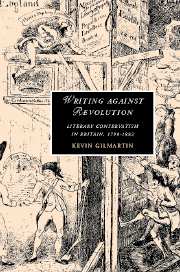Book contents
- Frontmatter
- Contents
- Illustrations
- Acknowledgments
- List of abbreviations
- Introduction: Reconsidering counterrevolutionary expression
- 1 In the theater of counterrevolution: loyalist association and vernacular address
- 2 “Study to be quiet”: Hannah More and counterrevolutionary moral reform
- 3 Reviewing subversion: the function of criticism at the present crisis
- 4 Subverting fictions: the counterrevolutionary form of the novel
- 5 Southey, Coleridge, and the end of anti-Jacobinism in Britain
- Notes
- Bibliography
- Index
- CAMBRIDGE STUDIES IN ROMANTICISM
1 - In the theater of counterrevolution: loyalist association and vernacular address
Published online by Cambridge University Press: 22 September 2009
- Frontmatter
- Contents
- Illustrations
- Acknowledgments
- List of abbreviations
- Introduction: Reconsidering counterrevolutionary expression
- 1 In the theater of counterrevolution: loyalist association and vernacular address
- 2 “Study to be quiet”: Hannah More and counterrevolutionary moral reform
- 3 Reviewing subversion: the function of criticism at the present crisis
- 4 Subverting fictions: the counterrevolutionary form of the novel
- 5 Southey, Coleridge, and the end of anti-Jacobinism in Britain
- Notes
- Bibliography
- Index
- CAMBRIDGE STUDIES IN ROMANTICISM
Summary
In the writing of history as well as in literary studies, conservative movements have generally played a negative role in accounts of the history of political expression in Britain during the period of the French Revolution. Where E. P. Thompson and others on the left tended to identify radicalism with the disenfranchised and with a struggle for the rights of free expression and public assembly, conservative activists have been associated with state campaigns of political repression and legal interference. Indeed, conservatism in this period is typically conceived in negative terms, as anti-Jacobin or counterrevolutionary feeling. If this has been the view of hostile commentators, it is consistent with a more sympathetic mythology that sees nothing novel about the conservative principles that emerged in late eighteenth- and early nineteenth-century Britain. They represent an establishment response to foreign and novel challenges. Even where conservatives set about mobilizing the resources of print, opinion, and assembly in a constructive fashion, the reputation for interference has endured. John Reeves' Association for Preserving Liberty and Property against Republicans and Levellers is an instructive case in point, since it managed in its brief but enterprising history to combine fierce anti-Jacobinism with the later eighteenth century's rising tide of voluntary civic activism. The Association came together at the Crown and Anchor Tavern when a group of self-professed “private men” decided “to form ourselves into an ASSOCIATION,” and announced their intentions through the major London newspapers in November and December of 1792.
- Type
- Chapter
- Information
- Writing against RevolutionLiterary Conservatism in Britain, 1790–1832, pp. 19 - 54Publisher: Cambridge University PressPrint publication year: 2007



